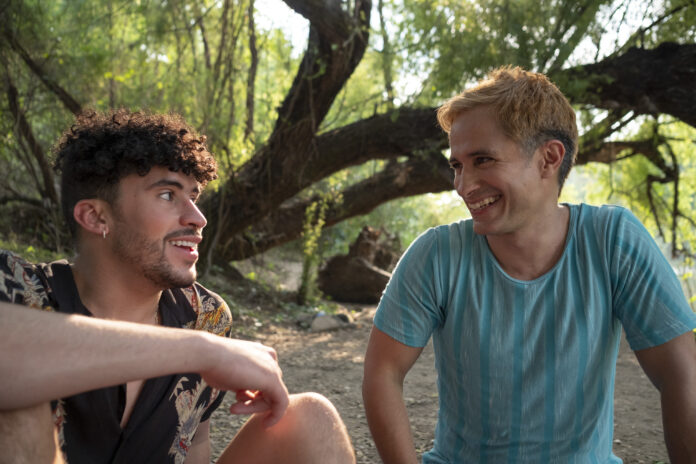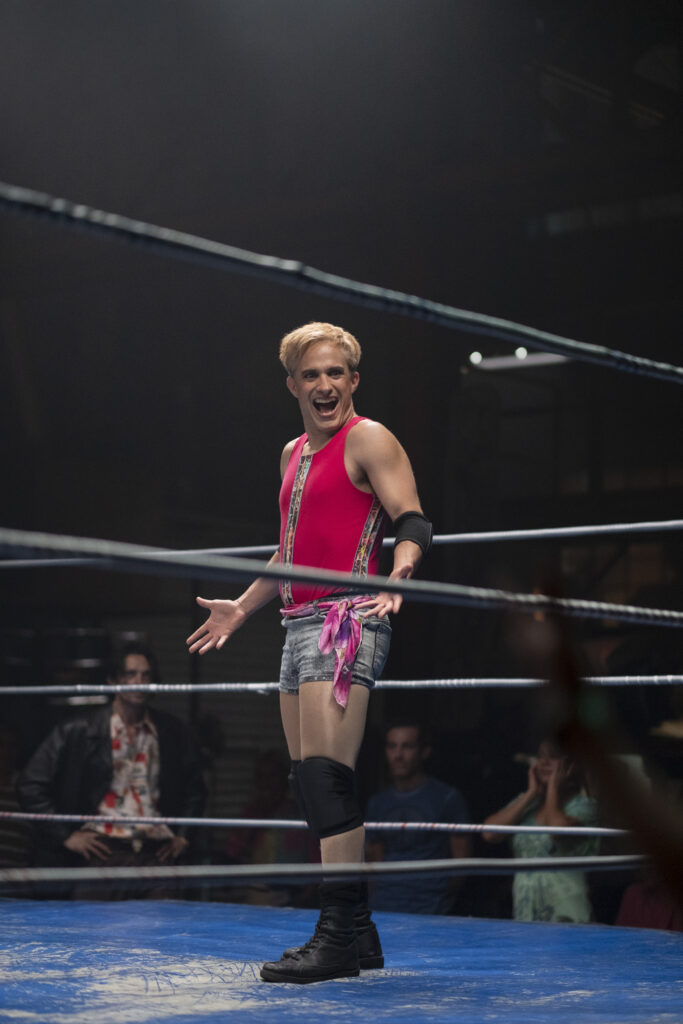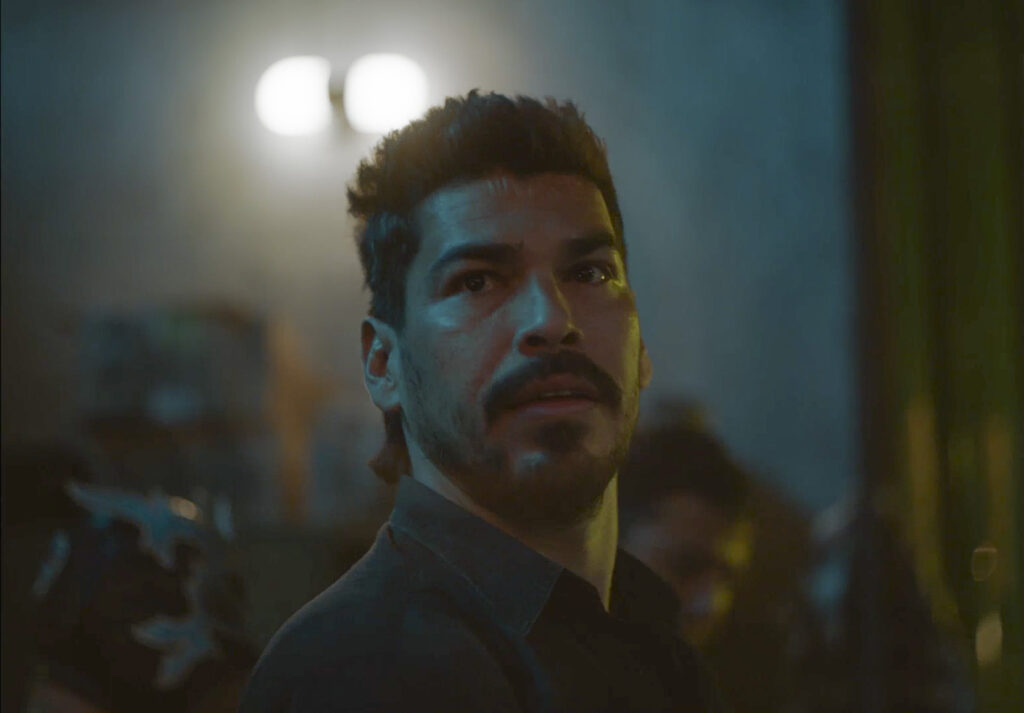
Regardless of what one may think about the sport of wrestling, “Cassandro,” set in the world of lucha libre, is an exciting and moving story of queer empowerment.
This fictional film, opening Sept. 15 in select theaters and available on Amazon Prime Sept. 22, is based on the life of gay wrestler Saúl Armendáriz (Gael García Bernal), a Mexican American in El Paso. He is first seen entering the ring as “El Topo,” a “runt” whose small stature makes him an easy defeat for his opponent, Gigantico (the real Gigantico). Saúl complains not about losing but that there is no poetry in Gigantico’s “performance.” And while Saúl admires the exótico wrestlers, they never win according to the sport’s rules.
But all that changes after Saúl connects with Sabrina (Roberta Colindrez), who trains him and supports his decision to wrestle as Cassandro, an exótico, with the expectation that he will win. Saúl makes Cassandro’s debut dazzling; he comes out wearing lipstick and hotpants and no mask, which defies lucha libre conventions. He even enters the ring to a Spanish-language version of Gloria Gaynor’s anthem “I Will Survive.” Before the victor is declared, Cassandro has won over the audience and a star is born.
Bernal will easily win over viewers with his multilayered performance here. The actor conveys Saúl’s ambitions and his heartbreaks wearing his emotions on his sequined sleeves while also creating a character in Cassandro that is opposite of himself in real life. “I think Cassandro is a top,” Saúl offers at one point, after sex. And Saúl flirts, seductively, with Felipe (Benito Antonio Martínez Ocasio aka Bad Bunny) in one scene where Saúl floats that idea that if Cassandro were here, he would kiss Felipe — though Saúl himself won’t, even though he obviously really wants to. (The handful of scenes between Saúl and Felipe have nice sexual tension.)

Saúl is constantly thinking and processing what happens to and around him and his alter ego as if calculating what he needs to do to realize his dreams. He may seem naïve at times — as when Lorenzo (Joaquín Cosio), a promoter, is looking to cash in on Cassandro’s success — but Saúl is in on the joke and understands the escapism and entertainment lucha libre wrestling provides its fans. Saúl knows how to deliver a show, which is why he is so ingratiating.
Director Roger Ross Williams also knows how to deliver a show, and he balances the on- and off-stage drama well, making viewers care about Saúl/Cassandro. Moreover, Bernal is incredibly charismatic as the title character. It is pure joy to see Cassandro showboating in the ring and playing up his femininity. He taunts the wrestling fans to call him “faggot” if only to upend their expectations about how “strong” this flamboyant gay man can be. But Bernal’s performance is more than just his badly dyed blonde hair, self-applied makeup, increasingly more fabulous costumes along with his nifty wrestling moves. (Give extra credit to Bernal for making the fake pain in the ring look so real.) He gives Saúl tremendous heart.
The bulk of the film focuses on Saúl’s personal relationships, which suffer even as he gains more success as a wrestler. He is very close with his supportive mother, Yocasta (Perla de la Rosa), who wants him to “find a nice guy, not some mean boy.” She is reluctant to attend his fights because she doesn’t want to see him get hurt. But when she sees Cassandro perform, she is inspired — and she gets into mama bear mode when a fan disses her son. Saúl dreams of buying his mother a house with a yellow kitchen. A nice scene has them sneaking into the property’s backyard pool. Saúl says that once he buys the place, he will make the pool heart-shaped, “just to be faggy.” Such is his unapologetically gay nature.
While Yocasta still has feelings for Saúl’s father, Eduardo (Robert Salas), watching him from afar from time to time, Saúl and his dad have not spoken since Saúl came out as a teen. This is Saúl’s Achilles heel given that Eduardo introduced him to luchadores when he was a boy. Yocasta does wonder how Eduardo will react when he learns his son is Cassandro.

Saúl also has a complicated relationship with Gerardo (Raúl Castillo), a married-with-kids luchador, with whom he is having a secret affair. Saúl wants Gerardo to be with him, especially as his career takes off, but Gerardo is adamantly opposed, which frustrates Saúl, who is tired of hiding their relationship.
“Cassandro” wisely shows Saúl being true to himself, which is why it is so gratifying. When Gerardo tells Saúl that the other luchadores think he is “getting too big,” Saúl only moves forward. He is pleased when Lorenzo offers him an arena fight in Mexico City with the legendary Son of Santo (the real El Hijo del Santo). However, Saúl has to prove himself worthy of such an important fight, a challenge that is a bit daunting.
Thankfully, the film does not end with the big match, but shows how Cassandro has inspired a young fan to come out, emphasizing the positive impact of being an openly gay wrestler. Saúl also has a bittersweet encounter with his father that is quite revealing. And these scenes show, like the sensational wrestling ones do, that the title character simply does not back down from a fight. This is why “Cassandro” is so winning.
